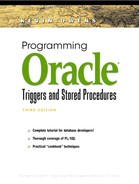2.10. SQL*Plus with Korn Shell
There are three topics covered in this section.
Invoking SQL*Plus from Korn Shell
Invoking Korn Shell from SQL*Plus
Passing arguments between languages
To embed SQL*Plus within Korn Shell, use Korn Shell Here-Documents. This Korn shell language feature allows “input redirection” to specify “in-stream text.” The syntax uses the symbol “<<,” which is followed by any character string—our example uses “EOF”. Following “<< EOF” is the input-stream text consisting of SQL*Plus command file.
The following shows just a Korn Shell script that prints the first two arguments.
#!/bin/ksh # KSH script to echo to parameters. echo $1 echo $2 # end of script
Korn shell precedes positional parameters with a “$” while SQL*Plus uses “&”. We can embed a SQL*Plus script within a Korn Shell script and run the Korn Shell script, passing arguments on the command line that are then passed to the SQL*Plus script.
The following Korn shell script accepts three arguments: username, password, and a string used to match column names. The column_name has scope within the SQL*Plus script.
#!/bin/ksh
# KSH script filename: script_01.ksh
username=${1}
password=${2}
column_match=${3}
sqlplus –s ${username}/${password} << EOF
SELECT table_name, column_name
FROM user_tab_columns
WHERE column_name LIKE UPPER ('${column_match}'),
exit
EOF
# end of script
We need to exit from SQL*Plus—to take us out of SQL*Plus and back to the Korn Shell. Thus we include EXIT, which is the last SQL*Plus statement within this script.
The “-s” is a “Silent Mode” option that suppresses superfluous messaging by SQL*Plus.
Within the SQL*Plus script, the Korn Shell parameter notation ($) is used.
SQL*Plus scripts can be encapsulated into distinct Korn Shell functions. The following table is a description of the Korn Shell functions used in the script.
| Korn Shell Function | Description |
|---|---|
| the_tablenames_are() | This generates a list of table names. |
| gen_table_report() | For each table name argument, this function displays all column names. |
| main() | This is where execution starts. This portion of the code pipes the output from the function “the_tablenames_are” into the function “gen_table_report.” |
############################################### # # FUNCTION: the_tablenames_are # #---------------------------------------------- function the_tablenames_are { sqlplus -s $username/$password << EOF set feedback off set pagesize 0 set echo off select table_name from USER_TABLES; exit; EOF } ############################################### # # FUNCTION: gen_table_report # #---------------------------------------------- function gen_table_report { sqlplus -s $username/$password << EOF set feedback off set pagesize 0 set echo off SELECT table_name, column_name FROM USER_TAB_COLUMNS WHERE table_name = '$1'; exit; EOF } ############################################### # # MAIN program code # #---------------------------------------------- username=${1} password=${2} the_table_names_are | while read tn do gen_table_report $tn done # ###############################################
SQL*Plus can “host out” to an operating system command using the SQL*Plus host command. Within a SQL*Plus script, you can include the SQL*Plus HOST command followed by any host command. The following is a revision of the aforementioned KSH script—this is just the SQL*Plus portion. This generates a spool file and immediately opens the spool file in an editor window.
SPOOL output
SELECT table_name, column_name
FROM user_tab_columns
WHERE column_name LIKE UPPER ('${column_match}'),
SPOOL off
HOST vi output.lst
When you run the aforementioned script, the output immediately pops up for viewing. The same can be done in Windows using: HOST NOTEPAD OUTPUT.LST.
